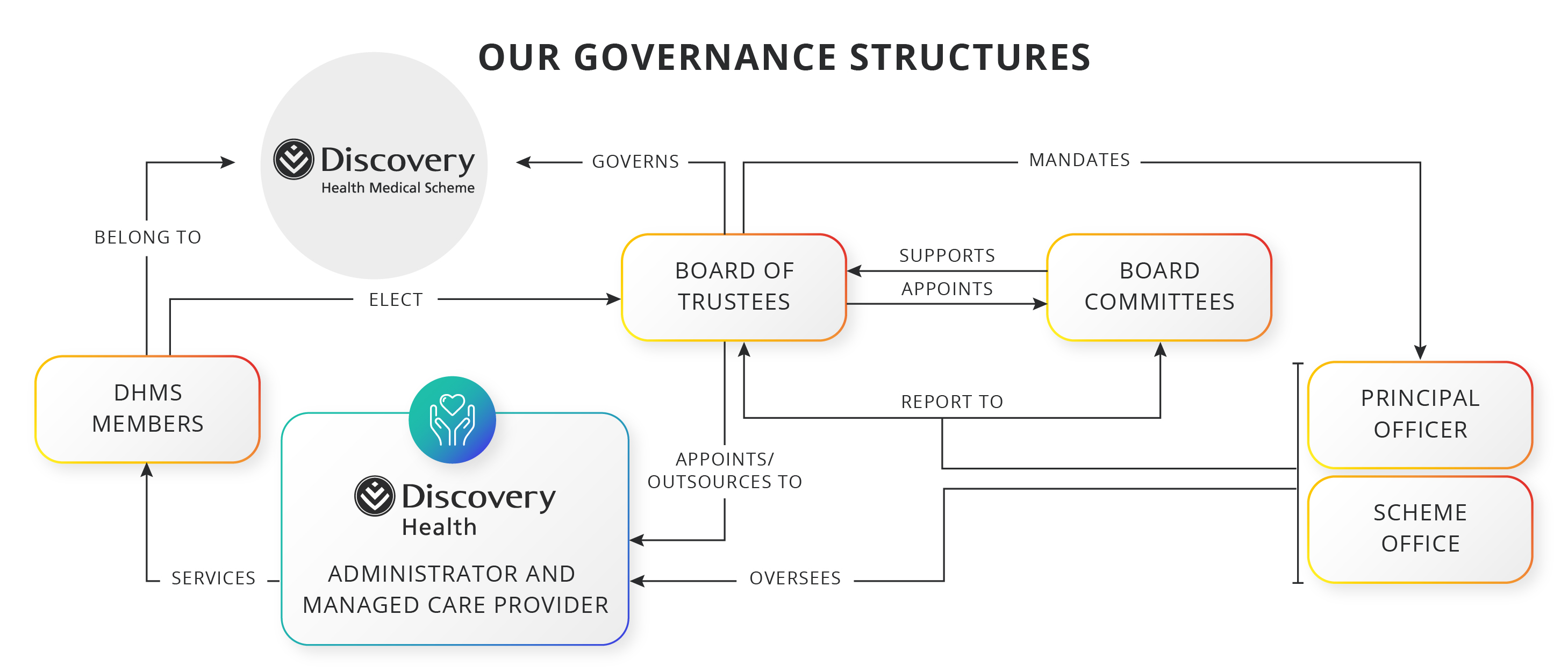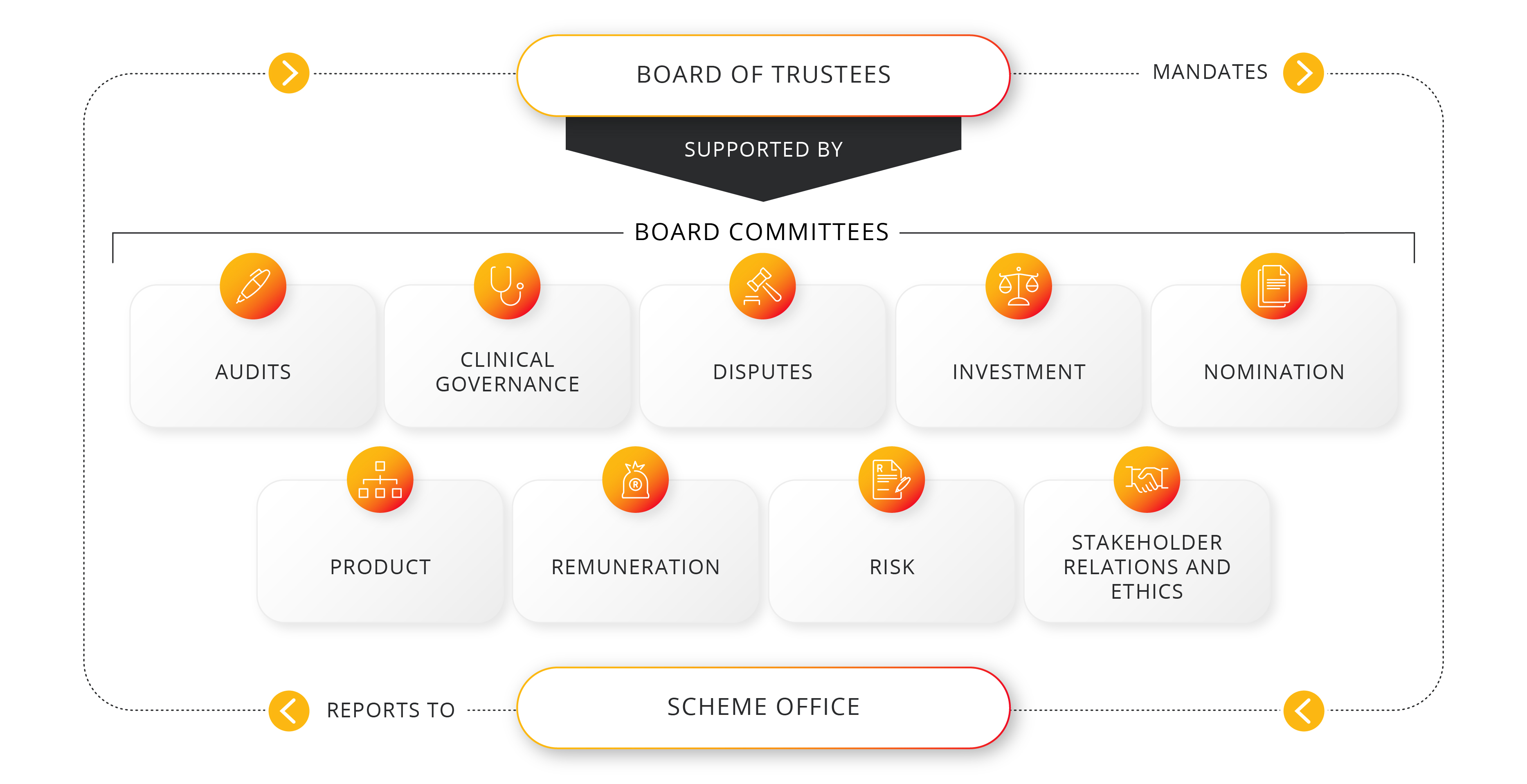How we are governed
The industry in which we operate is highly complex, making best practice governance both central to our business model (guiding our strategy, approach to risk and daily operations) and our continued ability to operate. We go beyond compliance, maintaining thought leadership and ensuring that we meet the needs and expectations of our members, providing them with sustainable access to affordable and equitable healthcare, and create and protect value for them, as well as other key stakeholders, while limiting value erosion.
All medical schemes in South Africa are governed by the Medical Schemes Act (the Act). Discovery Health Medical Scheme (DHMS or the Scheme) Rules are developed in accordance with the Act and approved annually by the Council for Medical Schemes (CMS).
Additional governance guidance is taken from the King IV Report on Corporate Governance for South Africa 2016 (King IV), which sets the standard for good corporate governance in South Africa and is internationally recognised as best practice. King IV defines corporate governance as the exercise of ethical and effective leadership by boards to achieve:
- Effective control
- Good performance
- An ethical culture
- Legitimacy
The Board of Trustees (the Trustees or the Board) embrace the principles of King IV in achieving optimal governance outcomes for the Scheme and within the Scheme environment. According to the Scheme Rules, the Scheme's affairs must be managed by a fit and proper board. Trustees are entrusted to lead ethically and effectively, both individually and as part of the Board, and must conduct themselves with requisite competence, integrity, accountability and transparency.
Our Governance Structures

DHMS is governed by an independent Board, responsible for overseeing the business of the Scheme. The Trustees hold decision-making power and are ultimately responsible for overseeing the Scheme's material matters, developing and implementing the Scheme's strategy, and responsibly managing its business and policies.
Furthermore, Trustees have a duty of care to the Scheme, whereby they are expected to:
- Act with honesty and integrity
- Avoid conflicts of interest
- Act in the members' interests
- Keep members' information confidential
- Comply with the Scheme Rules and relevant legislation
Our governance structures
Trustees are accountable to the Scheme's members and their foremost objective is to ensure that the best interests of Scheme members are served objectively, while safeguarding the sustainability of the Scheme.
The Board comprises independent, highly skilled professionals with a diverse range of specialisms, experience and professional backgrounds, bringing multiple perspectives to bear on discussions and debate ensuring robust oversight over all aspects of its functioning. Our Trustees' expertise extends across various fields including legal, actuarial, accounting, economics, governance, medical health (mental health), financial investment risk management. The Trustees discharge their fiduciary duties to ensure effective leadership and stewardship beyond attendance at meetings.
Composition and functioning
The affairs of the Scheme are managed by a Board of a minimum of five and a maximum of eight persons. At any given time at least five trustees must be elected by Scheme members from among scheme members at the Scheme's Annual General Meeting (AGM), with one balance member elected by DHMS members being appointed by trustees provided that number appointed trustees shall not at any given time exceed three.
The Scheme has no influence over election trustees resulting board composition due limited succession planning ability. In this regard, the Board appoints additional trustees with knowledge, experience, and skills to fill gaps where required, and may reappoint such trustees subject to a period of four years. They may serve two consecutive terms not more than four years each, with a cooling period of two years after elected terms, provided they were elected consumer appointed to serve a second term. Trustees have access to professional advice both within and outside the Scheme for proper execution of fiduciary duties and may obtain such other independent professional advice as they consider necessary.
The role of the Trustees
The Trustees are responsible for strategic oversight and sound management of the Scheme, together with protecting members' interests, avoiding conflicts of interest and ensuring impartiality. Trustees must ensure that measures are in place to assess any conflicts of interest that may arise, and manage them in accordance with best practice governance and any relevant legal requirements. In this regard they:
- Monitor, evaluate and make decisions regarding the equitable treatment of and benefits for all Scheme members in the interests of members and the sustainability of the Scheme;
- Evaluate, direct and monitor the Scheme's strategy, ensuring alignment with the purpose and value drivers of the Scheme, alongside the legitimate interests and expectations of members and other stakeholders;
- Evaluate the services offered by the administration and managed care provider (Discovery Health (Pty) Ltd (Discovery Health)) and whether they meet the needs of and offer value for money to the Scheme and its members;
- Monitor innovation and oversee the functioning of the Scheme Office, and the improvement of the Scheme's operations at all levels;
- Monitor adherence to Scheme Rules and the provisions of the Act in the day-to-day running of the Scheme's affairs; and
- Consider stakeholder perceptions and their impact on the Scheme's reputation. The Trustees appoint a principal officer for day-to-day operations and to oversee financial matters, including record-keeping and submission of financial statements to the regulatory authority. At all times, the Trustees must act with due care, diligence, skill and good faith in the best interests of the Scheme and its members.
The duties of the Trustees, set out in the Act and the Scheme Rules
- To appoint, delegate and evaluate oversight functions to the Principal Officer;
- To ensure the keeping of proper registers, books and records of all operations of the Scheme, and proper minutes of all resolutions passed by the Trustees;
- To ensure that adequate and appropriate information is communicated to members regarding their rights, benefits, contributions and responsibilities in terms of the rules of the Scheme;
- Take all reasonable steps to ensure that contributions are paid timeously in accordance with the Medical Schemes Act and the Scheme Rules;
- Take all reasonable steps to ensure that the interests of beneficiaries, in terms of the Scheme Rules and the provisions of the Act, are protected at all times while acting with impartiality in respect of all beneficiaries;
- Ensure the proper management of the Scheme by applying sound business principles to ensure its strong financial position;
- Take all reasonable steps to protect the confidentiality of medical records concerning the state of health of the Scheme's members, and ensure that the Scheme Rules, operations and administration comply with the provisions of the Act and all other applicable laws;
- Oversee and direct the management of the Scheme's outsourced activities performed by the administration and managed care provider;
- Ensure that the rules, operation and administration of the Scheme comply with the provisions of the Medical Schemes Act and all other applicable laws; and
- Ensure that proper control systems and record keeping are employed by and on behalf of the Scheme.
Trustee remuneration
Trustees are remunerated for their services in terms of the Scheme's Remuneration Policy. The benchmarked professional fees of Trustee and Board Committee Members are discounted in recognition of the Scheme's non-profit status.
In compliance with the Act, the registered Scheme Rules and in line with best practice governance principles, the Board has implemented appropriate governance structures to navigate and manage the complex operating environment, risks and strategic objectives of the Scheme.
The Board is supported by nine Board Committees which are constituted and structured according to the needs of the Scheme to assist the Board to fulfil its fiduciary and oversight duties effectively. Board Committee Members consist of both Trustees and Independent Members according to each Committee's requirements. Independent Board Committee Members serve three-year terms and are eligible for subsequent re-appointment for a further term but may not serve more than two consecutive terms. Committee Members are remunerated for their services in terms of the Scheme's Remuneration Policy.
The Committees report to the Board regularly, and each has its own terms of reference and clear procedures for reporting. The terms of reference set out each Committee's role and responsibilities, and are reviewed annually to ensure continued relevance to the business of the Scheme. The Committees make recommendations to the Board for the approval of any decisions to be taken.

As one of their fiduciary duties, the Trustees appoint and delegate accountability for the day-to-day management of the Scheme to the Principal Officer, who is the chief executive and accounting officer of the Scheme. The Principal Officer is required to execute the decisions of the Trustees and bears ultimate responsibility for all management functions. The Principal Officer must be fit and proper to hold this office and may appoint any staff, in accordance with the approved human capital plan, required for the proper execution of the business of the Scheme.
The Principal Officer is supported by an executive management team to execute the strategic objectives of the Scheme. The team works in collaboration with, and oversees work done by the Scheme's administration and managed care provider, Discovery Health, and other service providers to ensure execution within the governance framework in place.
The management team's expertise encompasses a broad range of capabilities including medicine, actuarial science, risk management, accounting, business management, strategic development, financial management, investment, governance, law, ethics, compliance and research.
Delegation of authority
To ensure effective accountability and responsibility within the Scheme, the Trustees can confer certain powers to its Committees and Scheme executives through a formal delegation of authority process. This process provides a framework for the Committees and Scheme executives to:
- Achieve strategic priorities;
- Effectively manage the Scheme within legislative compliance requirements;
- Balance the interests of Scheme stakeholders;
- Minimise and avoid conflicts of interest;
- Practice good corporate governance.
The delegation of authority is reviewed and updated periodically to ensure relevance to operating requirements and alignment with the accountabilities and authorities of Scheme employees.
Scheme Secretariat
The Scheme Secretariat ensures sound, best practice governance functioning at the highest level of the Scheme. The Secretariat provides the Trustees with support regarding their duties, responsibilities and powers, and ensures accurate minutes of all Board and Committee meetings are appropriately prepared, distributed and stored. The Secretariat also ensures that governance processes and procedures are implemented and maintained in accordance with the policies of the Scheme and as directed by the Trustees.

Principal Officer
Ms Charlotte Mbewu
BCom (Hons) Accounting; CA (SA) Council member of iFHP, board member of HFA and
a member of SAICA Medical Schemes Project Group.
Chief Executive Officer of the Scheme.